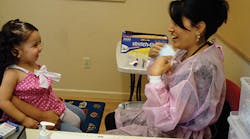The registered dental hygienist in alternative practice (RDHAP’s) value in community outreach
Listen to the article on our podcast!
A registered dental hygienist in alternative practice (RDHAP) is a licensed dental hygienist who’s received additional training and licensure in California, which allows them to provide dental hygiene services in various settings outside the traditional dental office without the supervision of a dentist. These settings include assisted living facilities, skilled nursing facilities, board and care facilities, hospitals, schools, residences, and community centers.
While a few other states now allow advanced practitioners in similar settings, the RDHAP license is specific to California. The primary goal of an RDHAP is to provide access to dental hygiene care for underserved populations and homebound communities in order to improve oral health outcomes.
Value of RDHAP in community outreach
The role of RDHAPs is vital for community outreach programs. One of the primary values is the ability to bridge the gap between dental care and people who face obstacles to accessing traditional dental services, such as the elderly, those with disabilities, low-income families, and those in rural areas.
An RDHAP can provide preventive care services such as cleanings, fluoride treatments, the application of sealants, and periodontal therapies such as scaling and root planing, without the supervision of a dentist. An RDHAP can own their own private dental hygiene practice in certain areas that are deemed by the county as underserved.
In addition to providing treatment, they can educate patients and caretakers about proper oral hygiene practices, which helps prevent dental diseases before they escalate. RDHAPs can serve as a liaison between patients and their other health-care providers to enhance the patient's overall health and well-being.
RDHAPs often collaborate with public health organizations to provide education about oral health topics and to create community-based programs that address specific local needs. By collaborating with local agencies, RDHAPs guarantee that essential preventive care is delivered to underserved communities. Their presence in community outreach helps raise awareness about the importance of oral health, which is often overlooked relative to overall health.
Another vital aspect is advocating for policy changes that improve access to dental care. RDHAPs can engage in initiatives to boost funding for oral health programs, support preventive care efforts, and advocate for policies that benefit underserved communities. This is crucial for driving systemic changes that can promote long-term advancements in public health.
The personal experience of an RDHAP
Albeit challenging at times, my overall experience as an RDHAP has been extremely rewarding, specifically in board and care facilities. In these settings, I’ve had the opportunity to work with small groups, which allows for personalized for my patients and their family members. Many residents face challenges accessing dental care, often due to mobility issues or lack of transportation.
It’s so satisfying to provide treatment to compromised patients who otherwise would not receive it. This has also deepened my empathy and understanding of the unique needs of underserved populations, and has ultimately emphasized the profound impact that compassionate care can have on people’s lives. By providing preventive care and education to their bedside, I make a direct, tangible difference in their lives and overall wellness.
My experience has shown me that this role is not just about clinical treatment—it’s about empowering underserved individuals, fostering relationships, and contributing to the overall health and wellness of the community. RDHAPs play a vital role in shaping healthier communities, advocating for change, and delivering care where it’s needed most. As we move forward, it’s crucial to continue supporting and expanding the RDHAP profession to enhancing public health initiatives throughout our communities.
Editor's note: This article appeared in the January/February 2025 print edition of RDH magazine. Dental hygienists in North America are eligible for a complimentary print subscription. Sign up here.









